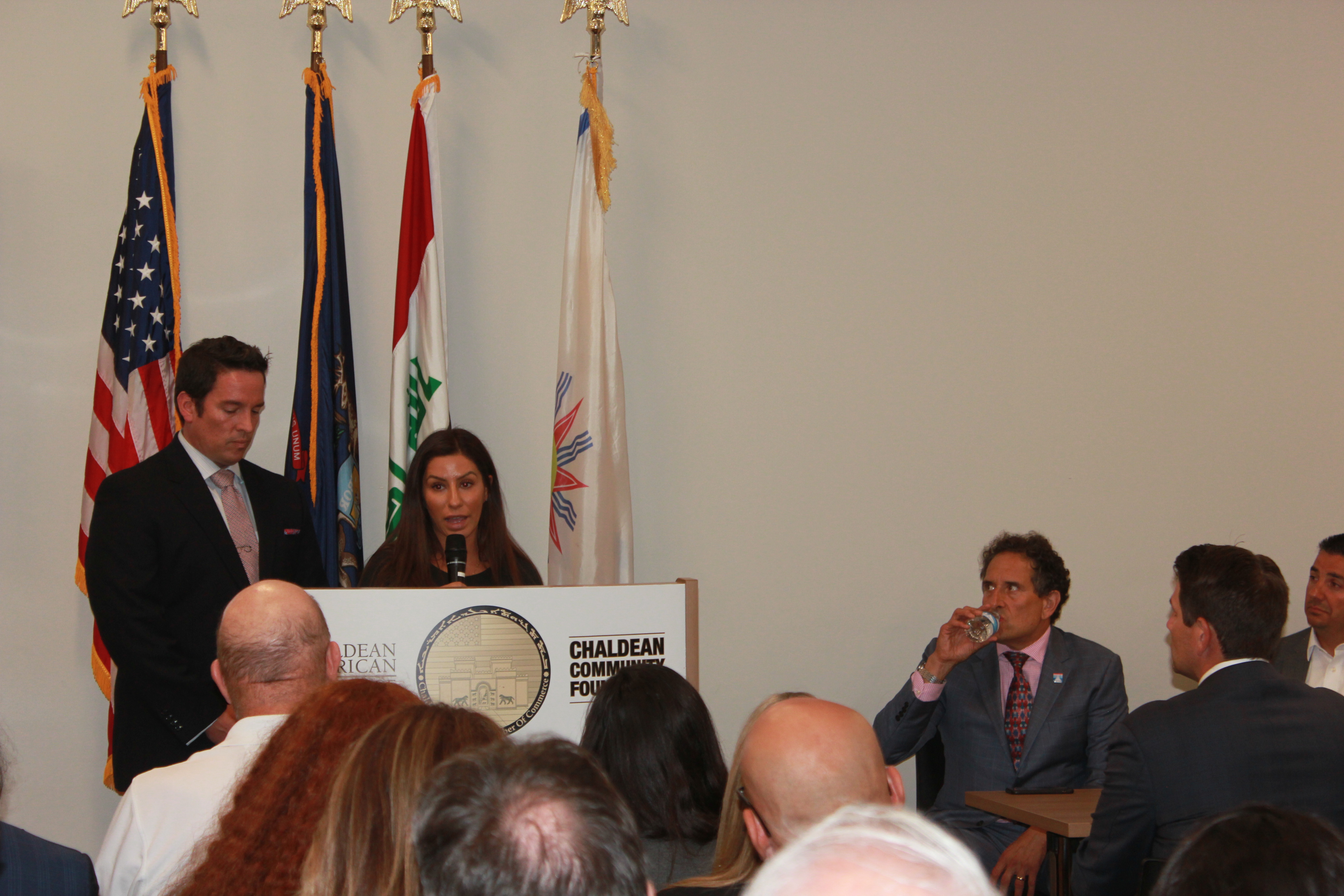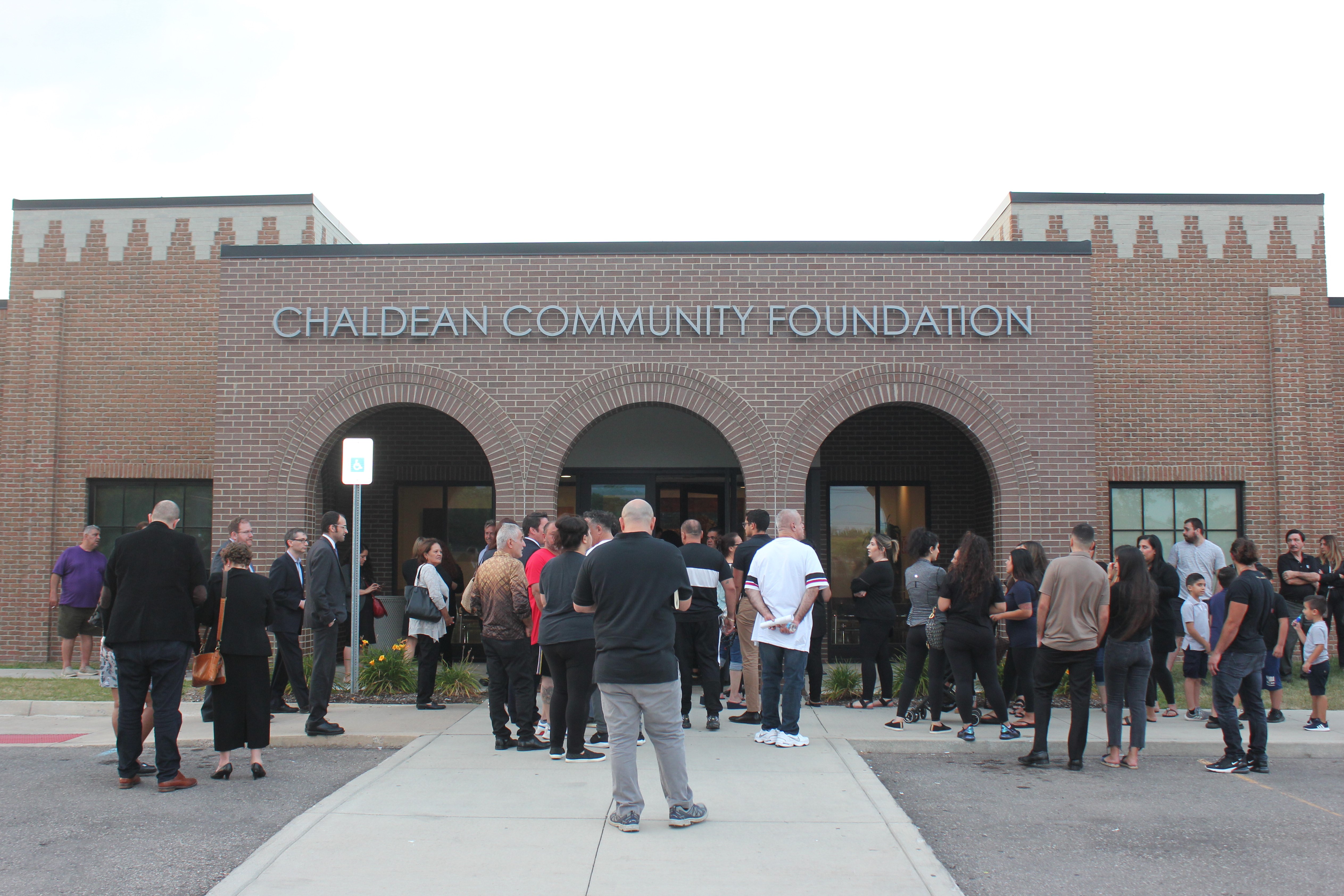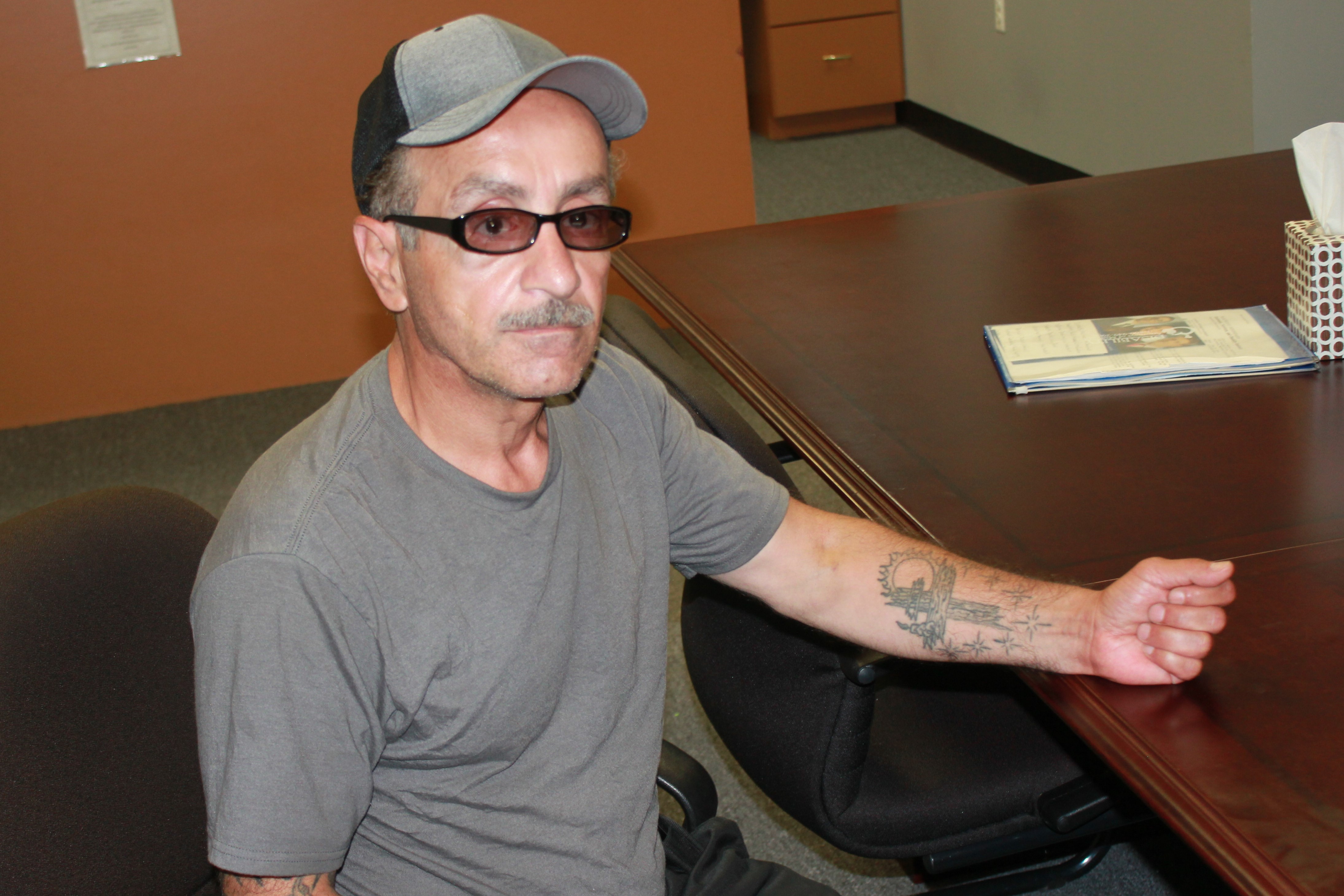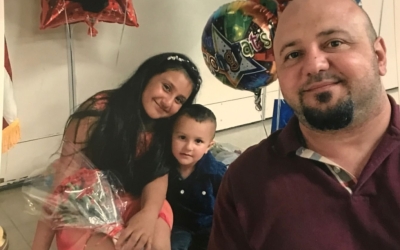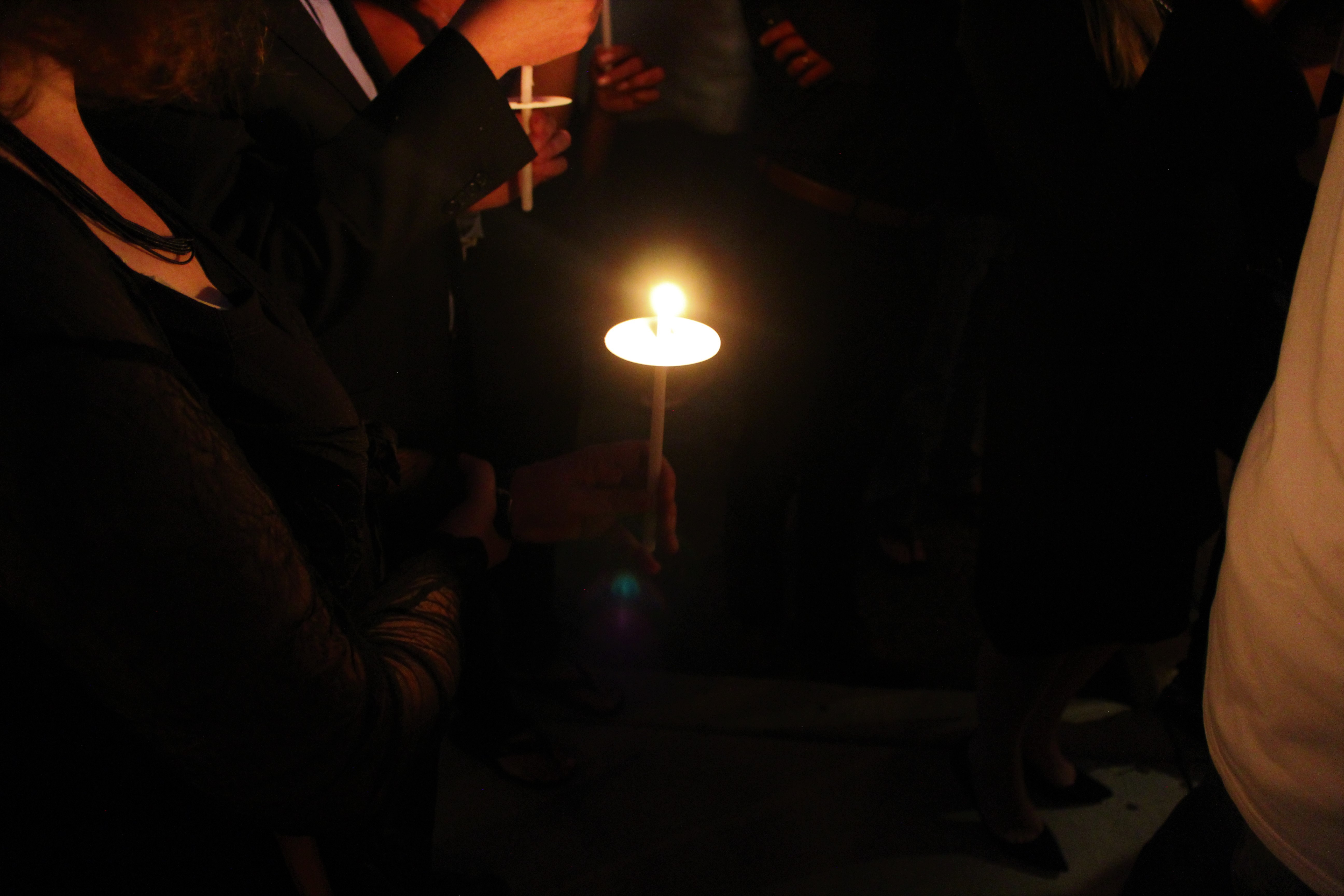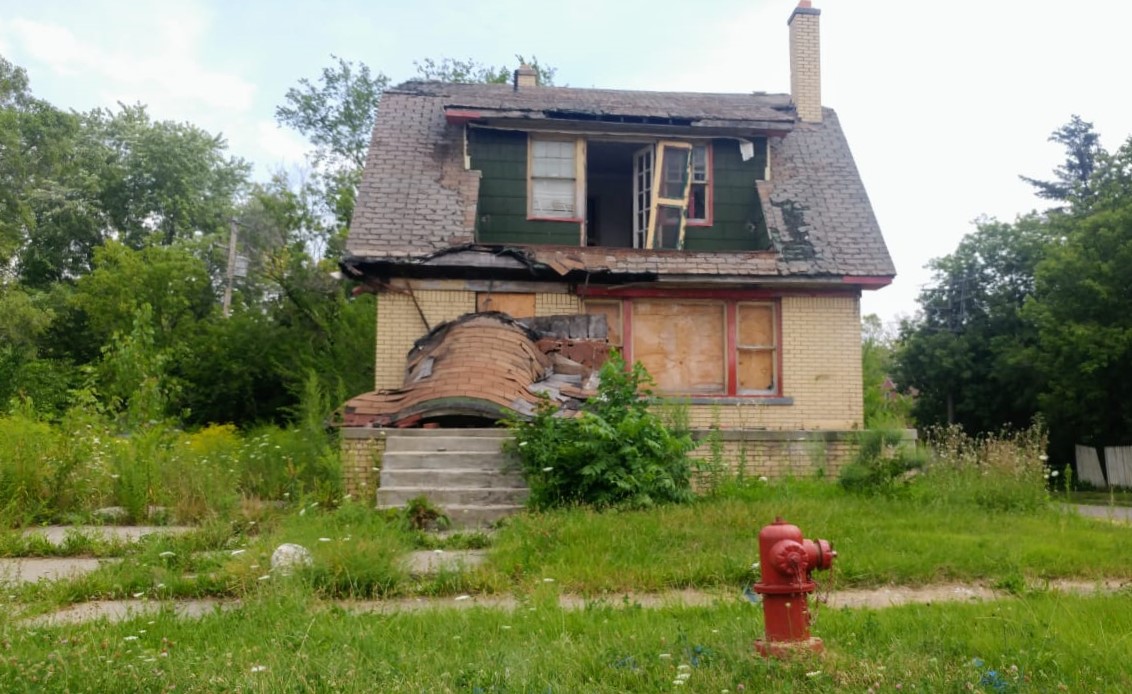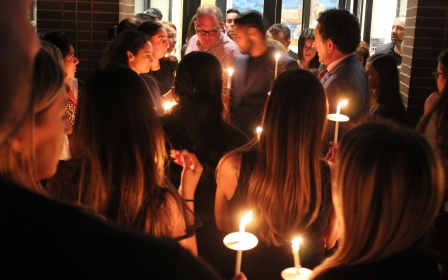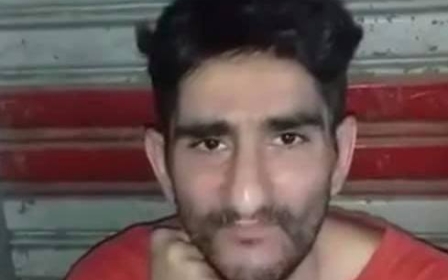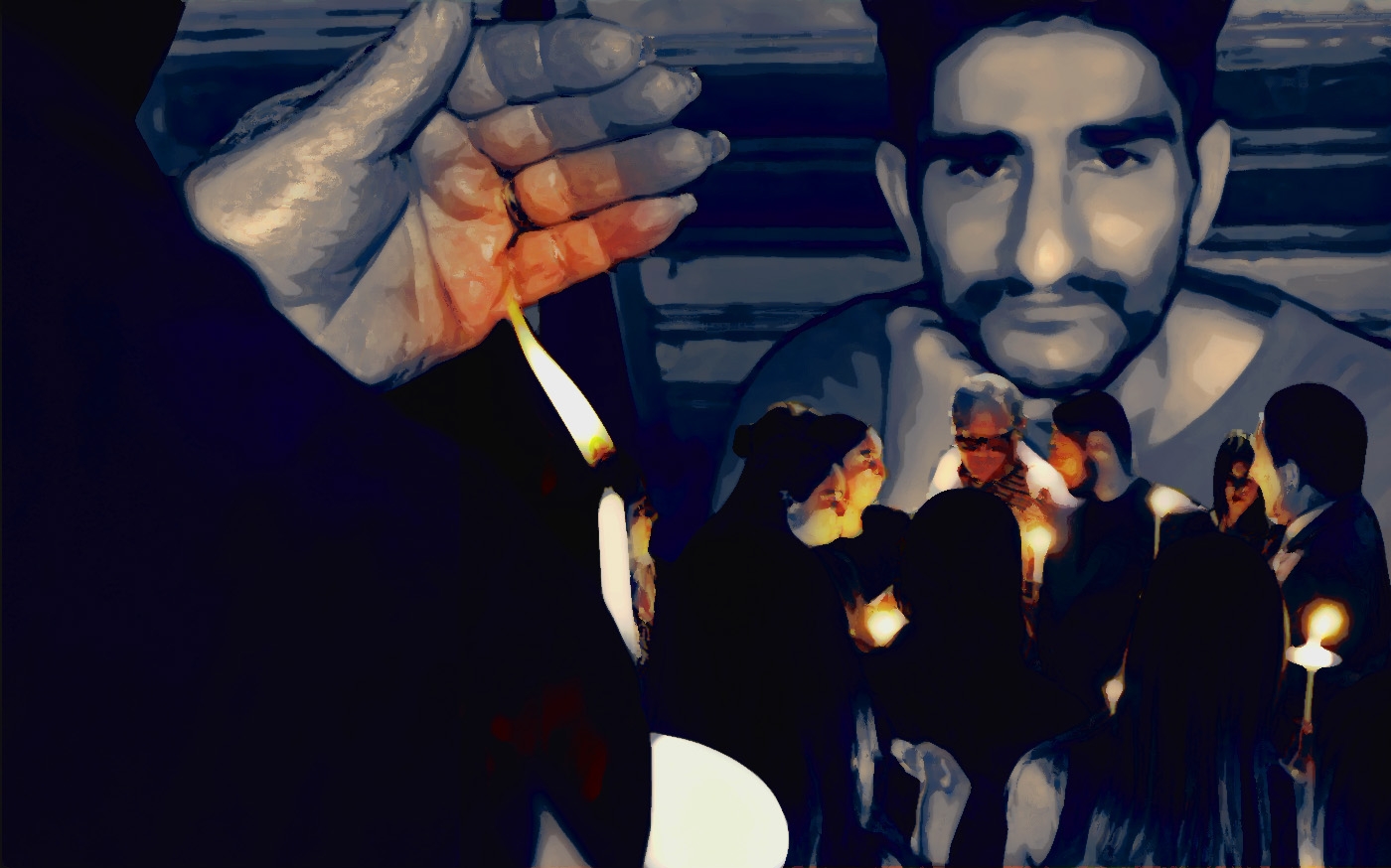
Jimmy Aldaoud's death confirms worst fears about Trump's deportations
Rita Bolis struggles to find the words.
Her older brother, Jimmy Aldaoud, was found dead in Baghdad in early August, two months after his deportation to Iraq, a country he had never visited. Bolis and her family are still in shock.
"No one really deserves to die like this. He was scared and alone," she says, choking back tears as she spoke at a vigil near Detroit, surrounded by more than 100 mourners.
"I'm not really good at this," she says, as tissues are handed out to the attendees. Her tears are contagious.
New MEE newsletter: Jerusalem Dispatch
Sign up to get the latest insights and analysis on Israel-Palestine, alongside Turkey Unpacked and other MEE newsletters
Aldaoud died from a lack of access to insulin in Baghdad, where he had struggled to find a home or communicate with people.
Outside the Chaldean Community Foundation in Sterling Heights, where Bolis had shared her grief, the mourners gather with candles, their hands protecting the flames from a breeze on an otherwise warm August evening.
With two towers flanking its main entrance, the foundation's building is modelled after the Ishtar Gate of Babylon. Chaldean Catholics take pride in their Mesopotamian heritage as much as in their Christian faith.
As Congressman Andy Levin calls for a moment of silence for Aldaoud, a member of the crowd suggests reciting the Lord's prayer.
"Our Father, who art in heaven, hallowed be thy name, thy kingdom come…"
Then there is silence, disturbed only by the occasional sound of journalists' camera shutters.
Aldaoud's death captured the attention of the nation, making headlines in almost all major media outlets in the United States. His tragedy came to embody the cruelty of President Donald Trump's immigration policies.
A 41-year-old who moved to the United States when he was six months old and spent his adult life battling homelessness and mental illness was sent to a war-torn country where he did not speak the language and died two months later.
The tragedy was "predictable", activists say.
Aldaoud, who was born in a Greek refugee camp to Iraqi parents, was flown to the Shia-majority southern city of Najaf after losing his battle to stay in the US.
'I can't make it there'
Immigration advocates had warned that Iraqis who have been living in the United States for a long time would not survive if they were deported to the Middle Eastern country.
Aldaoud's case proved them right.
Awraha Daniel knows he may share the same fate.
"I think about it," Daniel says, reaching for a sip of water as he struggles to keep his tears at bay.
With brain trauma, limited financial resources and no family or roots in Iraq - a country he left when he was 5 years old, Daniel says his fight against deportation is a battle for his life.
He knew Aldaoud personally, as they were held at a detention centre in Ohio in 2018.
"I still feel sorry for him, you know," the 51-year-old says, allowing tears to stream down his cheeks. "I'm getting a little bit emotional because I just saw a video he made before he died."
In an undated message shared widely after his death, Aldaoud talked about his dire conditions in Iraq.
"I don't understand the language," Aldaoud said in the video. "I'm sleeping in the street. I'm diabetic. I take insulin shots. I've been throwing up... trying to find something to eat. I've got nothing over here."
Daniel said Aldaoud was a "soft-spoken", gentle person who faced difficult challenges in the US.
But it was the deportation that killed him, Daniel tells MEE, sitting at his lawyer's office in the Detroit suburb of Dearborn.
With wisps of grey hair on either side of his baseball cap and a scar across his left cheek, his eyebrows arch as he sighs and shakes his head while talking about Aldaoud.
"How do you deport somebody to a country that they weren't born in and they don't speak the language? That's not right."
Daniel says his own case is not dissimilar from that of Aldaoud. His family left Iraq for Kuwait when he was 5 and moved to the US four years later. His Arabic vocabulary is limited and a head injury has left him sometimes grasping for words even in English.
Daniel was transferred to the custody of American immigration authorities immediately after serving jail time for a minor criminal offence in March 2018.
"I can't make it there," he said, of the prospect of life in Iraq.
"I wouldn't be able to live without my medication. I can't fall asleep from my severe brain trauma. If I don't take my medication, I would stay up for days. I once had a nervous breakdown. I stayed up for a week."
How it all started
When Trump announced his run for the presidency in 2015, he pledged to deport millions of people who were in the United States illegally.
Even vulnerable immigrants who have nowhere else to go, like Aldaoud and Daniel, have not been spared.
The Trump administration has ramped up its efforts to deport Iraqis since Baghdad agreed in 2017 to take deportees from the United States, reversing a decades-long policy.
Still, Iraq has remained hesitant about accepting many of the deportees, resisting granting them Iraqi identity cards or passports.
Aldaoud, for instance, was sent to Iraq on a "laissez passer" travel permit that only allowed him to enter the country. It is not clear if he would have qualified for Iraqi citizenship.
Baghdad's embassy in Washington did not return MEE's request for comment.
The Iraqi government's decision came as a part of a deal that saw the country removed from Trump's "Muslim ban".
As Iraq disappeared from the list of countries whose citizens were barred from entering the US, American immigration authorities embarked on a campaign to deport 1,400 Iraqis, many of whom had been living in the US for decades.
"Jimmy's death is a side effect of the travel ban," Edward Bajoka, an immigration attorney close to Aldaoud's family, told MSNBC earlier this month.
Most of the immigrants targeted by the crackdown had come to the US legally, but lost their permanent residency status because of criminal convictions or administrative issues.
The Iraqi Christian community in Michigan bore the brunt of that campaign, raising fears that deportees may be targeted in Iraq because of their religion.
'It hurts'
Daniel, a father of two, has a big cross tattooed on his forearm. He was detained for eight months in 2018 by Immigration and Custom Enforcement (ICE), the US agency that enforces deportation orders.
His brother was murdered in Detroit while Daniel was in ICE custody.
"It hurts. I mean, what can you do? I cried in there. It was very hard. I was in there praying, crying every day," Daniel says.
"It was stressful, one of the hardest times of my life. You can't grieve with nobody. Your brother is being buried and you just want to get out and find out what happened."
He says he also struggled to access his pain medicine while in detention.
Over the past two decades, Daniel has suffered a broken jaw, cracked skull, fractured cheekbone, gunshot wound to the arm and a major eye injury. He says his body often aches as a result of nerve damage.
"I got multiple fractures. I'm always in pain - when I blink, when I talk, when I move. I'm always in pain," he says.
His brain trauma has also caused a range of psychological issues, including irritability, depression and insomnia.
Daniel says his run-ins with the law started at a young age in his "rough" neighbourhood in east Detroit.
He came to the United States legally with his family. Before 9/11, he applied for naturalisation and passed the required civics test. But after the attacks, immigration authorities began asking for additional documents that he was not able to acquire. Eventually, he was told to reapply and re-start the process, something he never got around to doing.
In 2002, he was assaulted with a baseball bat after a personal dispute. The incident left him in a coma for several months. When he woke up, his life was irreversibly changed.
Daniel would later be convicted on two felony counts of running and attempting to run away from police. He says he became paranoid after the assault, thinking that law enforcement officers were out to kill him.
In the next decade, he would rack several criminal convictions in a series of what he called unfortunate events stemming from the brain damage he suffered in the assault.
Like hundreds of other immigrants, Daniel lost his permanent residency because of criminal offences.
And with Iraq now accepting deportees and the Trump administration adamant about removing deportable immigrants from the country, Daniel is now a target.
His immigration case is set to be heard in court next year.
Daniel's lawyer, Shahad Atiya, told MEE that she plans to call for a freeze on his deportation order under the UN Convention Against Torture, to which the US is a signatory.
Immigration lawyers have been arguing that sending people to places where they may be persecuted or tortured is in violation of that treaty.
Atiya said immigration courts do not offer the same constitutional protections as criminal courts. Rather, they follow a rigid administrative process that stacks the odds against immigrants.
In immigration court, people at risk of deportation don't have the right to an attorney at the expense of the state, and their fate is decided by a government-appointed judge, not by a jury of their peers.
Immigrants in government custody also are referred to as "detained" rather than "arrested", as arrests come with a list of rights they are not afforded, Atiya said.
She added that while this process has been enforced for years, Trump has found the "most evil" way to interpret the statutes in order to ramp up deportations.
"The process we apply to deport people is administrative. It's the same way you argue against your traffic tickets," Atiya said. "We're sending people to their deaths using the same process as a speeding ticket."
The legal battle
Despite all their flaws, immigration courts have been able to grant relief to at least 40 Iraqi immigrants, while 300 people have been able to reopen their cases, according to Margo Schlanger, a lawyer with the American Civil Liberties Union (ACLU).
When the crackdown began in 2017 with the unprecedented detention of hundreds of people, the ACLU and other organisations came together to push back against the government and protect the detainees.
They scored a major victory early in the legal battle, when in July 2017 US District Court Judge Mark Goldsmith ruled that the government cannot deport people without allowing them to challenge the orders of removal in immigration courts.
Later that year, the judge opened the door for freeing the detainees - many of whom were pressured to agree to their own deportations to avoid prolonged time in jail - by ordering the government to agree to hold bond hearings for the immigrants in custody.
'If we as a society care about life and liberty... then we cannot be deporting people to a place where they could be persecuted, tortured and killed'
- Miriam Aukerman, ACLU
In January 2018, Goldsmith ordered the release of all the detainees, a move that allowed them to return to their families as they continued to fight against their deportations in a protracted legal process that may last years.
Then a US court of appeals ruled last December that Goldsmith had no authority over the matter. The government was able to resume the deportation of Iraqis - without court hearings - in April of this year.
With at least 69 Iraqis deported since the beginning of 2018, ACLU lawyer Miriam Aukerman said she is not certain that Aldaoud was the first deportee to die in Iraq.
And if the deportations continue, he won't be the last, she told MEE. "If we as a society care about life and liberty, which are really fundamental American values, then we cannot be deporting people to a place where they could be persecuted, tortured and killed," Aukerman said.
"Yet that's exactly what ICE is doing," she added.
After the appeals court's decision, Congressman Andy Levin, a Michigan Democrat, introduced a bill to stop the deportation of Iraqi immigrants without allowing them their day in court.
Aldaoud's death has renewed calls for US lawmakers to push the bill through Congress.
Still, Levin told MEE he wants the bill to get to the president's desk with strong bipartisan support so that it can go beyond making a political statement. The bill must achieve its practical aim: stopping the deportations, he said.
"This is about saving people's lives day by day, so it's got to get through the House and the Senate," said Levin, who called on his Republican colleagues to adopt the measure after Aldaoud's death.
"It's truly fine to want to enforce immigration laws, but it should not be a death sentence."
Community gripped by fear
For many advocates, especially those working on the issue of deportations, Aldaoud's case confirmed their fears that sending immigrants to Iraq may be tantamount to a death penalty.
"The Trump administration's urge to finally carry out these removal orders was senseless," said Aldaoud's personal immigration lawyer, Chris Schaedig.
"There was no reason for it in the first place, and the amount of fear that it has sowed in the Chaldean community in Metro Detroit is substantial."
When Aldaoud was found dead in Baghdad, that fear was amplified.
It is so rampant, in fact, that some immigrants have resorted to cutting off the GPS tethers they had to wear after being released from ICE detention, preferring to face criminal charges for removing the tracking devices, and thus postponing their deportations.
Attorney Shanta Driver is representing two immigrants in Michigan who cut their tethers.
On 21 August, both suspects pleaded not guilty to federal criminal charges over removing the GPS trackers.
And last month, Driver urged another client, Oliver Oshwana, to scream and yell on a plane that was supposed to take him from Chicago to Turkish capital Ankara and eventually to Iraq.
"We told him, 'You just can't go along with this. You have to make it clear for the people on that plane, most importantly the pilot and the flight attendants that you are being taken back to your death,'" Driver said.
The tactic worked: The pilot removed Oshwana from the plane, and now his immigration case is open again.
Driver said she plans to argue that sending Oshwana - a Christian refugee who survived a knife attack in Baghdad before moving to the US in 2006 - back to Iraq would be in violation of the UN Convention against Torture.
"At this point, if we can't win protection for Oliver Oshwana under the Convention Against Torture, then the Convention Against Torture means nothing in the United States," she said.
'Chewed him up and spit him out'
Oshwana has been spared Aldaoud's fate, at least for now. He lost his legal status in the US after shoplifting convictions that Driver said were caused by a drug problem. His drug issues were induced by post-traumatic stress disorder (PTSD) after enduring the war in Baghdad.
Aldaoud, too, had a drug problem, according to several people who knew him. The late deportee did not have an easy life in the United States.
He fell out with his father and moved out of his family's house when he was a teenager. His first arrest was over a domestic dispute with his dad. Assault charges from that conflict led to a conviction that rendered him removable from the country.
Aldaoud was not born in Iraq. He moved to the US with his family from a refugee camp in Greece when he was six months old.
He was homeless for long stretches of his life. And despite his apparent mental illness, he never received the help he needed. Aldaoud would stay in abandoned homes on the Detroit side of Eight Mile Road, which separates the city from his hometown of Hazel Park, a suburb of about 16,000 residents.
'We're sending people to their deaths using the same process as a speeding ticket'
- Shahad Atiya, lawyer
There, abandoned homes are plentiful. Run-down structures dot the streets with lawns overgrown by weeds and windows boarded up.
This is where Aldaoud would often hang out, trying to hustle a few dollars to stay afloat, some people in the area who knew him told MEE on a visit earlier this month. He was never a menace. In fact, people in the neighbourhood praised his kind-heartedness and sense of humour.
"He was harmless, an all-right guy. He never bothered nobody," said Ernie Steimke, a pensioner from the neighbourhood. "I told him to come and cut my grass and make a few bucks. I'd trust him with my backyard."
Other bystanders at a gas station on Eight Mile also said Aldaoud was a positive figure in the area. "He was my friend. Jimmy was a great guy. He didn't have no enemies," said a man who didn't want to give MEE his name.
Johnny Griffin, a homeless man on a green bike with no rubber or apparent brakes on the handle bars, said he used to eat and use drugs with Aldaoud, describing him as funny and peaceful. But life was difficult for Aldaoud, said Griffin.
"Once you're in this deep, the streets is a full-time job on its own. You've got to figure out how to bathe and what to eat," he said. "Getting a job is easy, trying to hold one is the problem - the hygiene, managing to make it to work on time, everything sort of falls down."
As he described those challenges, Griffin remained stoic, speaking with a straight face and in a steady tone. But he became animated as he addressed Aldaoud's deportation. "I think it's bullshit. I love my country. I was born and raised here. But I hate my fucking government. It's fucking twisted. They do some shit that don't even make sense."
Schaedig, the lawyer, refused to comment on whether Aldaoud had a drug problem, but he said his late client was certainly not getting help if he had one, adding that the 41-year-old was suffering from mental health problems.
Aldaoud would go from being happy and grateful to the depths of despair, a psychological state that made him difficult to communicate with, Schaedig said.
The system came after Jimmy, chewed him up and spit him out
- Chris Schaedig, lawyer
The lawyer urged people not to judge Aldaoud based on his long rap sheet, as he had been arrested several times for petty theft and other offences since early adulthood.
"I would be comfortable saying they all stemmed from mental illness and/or homelessness," Schaedig said.
The lawyer said Aldaoud would walk around the neighbourhood looking for change left in unlocked cars' cup holders. One of his larceny convictions came after he took a sum of two dollars and a lighter from a car.
"This was not a guy who's out there committing crimes. He was not malicious," Schaedig said. "He was somebody who needed to be taken care of."
"He - despite those mental issues - was a sweet man, not threatening," Schaedig told MEE. "Despite the fact that he was a high school drop-out, my first impression of him was that he was not a stupid man at all; he was intelligent and funny."
Asked how the system failed Aldaoud, Schaedig said US immigration laws do not protect powerless individuals, as immigration courts strictly follow the administrative process without taking into consideration special conditions, including mental illness.
The lawyer also blamed Trump for Aldaoud's fate, saying the administration's campaign against Iraqi immigrants is needless.
But hours later, speaking at the vigil for Aldaoud, Schaedig revised his answer.
"The system did not fail Jimmy," he told the crowd of mourners.
"The system came after Jimmy, chewed him up and spit him out… The system did not fail. It did exactly what it was intended to do - to take a vulnerable person and sentence him to death.
"And the system will do it again if we don't all keep fighting."
Middle East Eye delivers independent and unrivalled coverage and analysis of the Middle East, North Africa and beyond. To learn more about republishing this content and the associated fees, please fill out this form. More about MEE can be found here.



